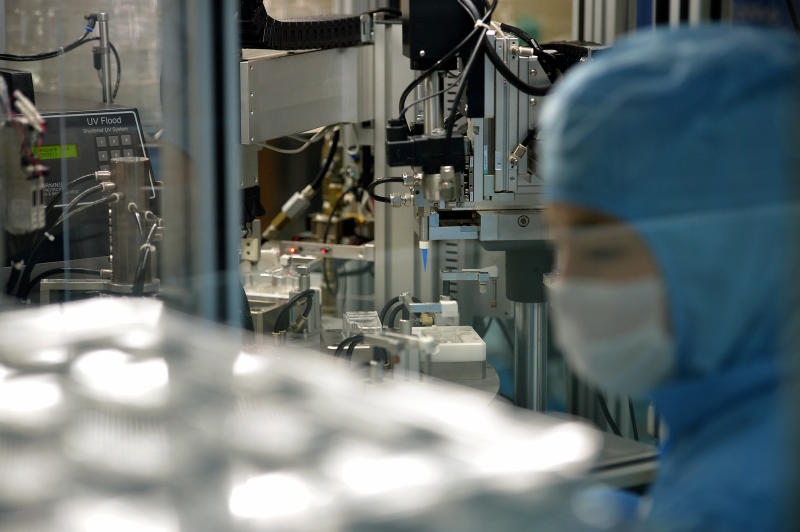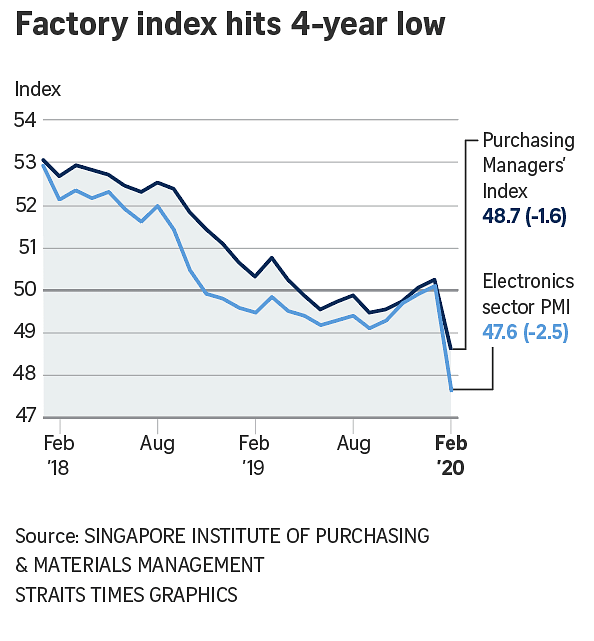Singapore manufacturing shrinks in February at fastest pace since 2014 on coronavirus outbreak
Sign up now: Get ST's newsletters delivered to your inbox

The Singapore Purchasing Managers' Index fell 1.6 points in February, the biggest drop in a month since August 2014.
PHOTO: ST FILE
SINGAPORE - Manufacturing shrank in February at the fastest pace in more than five years, reflecting the disruption caused by the coronavirus outbreak.
The decline was led by the electronics sector, which had expanded in January for the first time after languishing in contraction territory for 14 straight months.
The Singapore Purchasing Managers' Index (PMI) fell 1.6 points in February, the biggest drop in a month since August 2014, according to data from the Singapore Institute of Purchasing and Materials Management (SIPMM).
The first contraction in three months pulled the PMI down to 48.7, the lowest level since February 2016. A reading over 50 indicates expansion, while a reading below points to contraction.
The electronics PMI fell 2.5 points from the previous month to 47.6, the lowest since December 2012. The decline was also the biggest in a month since October 2012.
This is the first set of data to show the true extent of the hit the economy might take from the outbreak.
The Government last month downgraded its GDP growth forecast, raising the possibility of the first full-year recession in about two decades.
The dip in Singapore's manufacturing activity follows reports from around the world this week showing factories taking a beating from the outbreak.
Activity in China shrank at a record pace. US manufacturing activity also slowed in February as new orders contracted. Japan's factory activity was hit by the sharpest contraction in nearly four years.
Key economies in the global technology supply chain also suffered.
Manufacturing in South Korea shrank at a faster pace, while in Vietnam and Taiwan, activity slipped into contraction.
Ms Sophia Poh, vice-president of industry engagement and development at the SIPMM, noted: "The Covid-19 outbreak that accelerated at the end of January has disrupted global supply chains and impacted the manufacturing sectors."
Key components of the Singapore PMI - new orders, new exports, factory output, inventory and employment - all declined, reversing the gains in the final months of 2019.
Imports, input prices, supplier deliveries and order backlog also snapped out of the recovery mode. The finished goods index posted a slower rate of expansion.
Beyond disrupting factory supply chains and undercutting exports, the outbreak that is now spreading fast across the Western Hemisphere has also led to a global slowdown in travel that may hamper the service industry.
United States financial markets led a global rout last week amid fears that the coronavirus outbreak may derail the longest US economic expansion on record, now in its 11th year.
"Manufacturers are increasingly concerned about the extent of this disruption, especially when the rate of infections are increasing worldwide," Ms Poh said.

However, tentative signs of workers in China slowly returning and factories starting to ramp up production may help start the stabilisation process in manufacturing across the region.
Dr Chua Hak Bin, a senior economist at Maybank Kim Eng, said: "We think the PMI will likely jump in the second quarter as companies restart and catch up on pent-up orders, as supply disruptions dissipate."
"Manufacturing and exports will likely stage a V-shaped recovery, while tourism and air travel are likely to see a prolonged U-shaped slump," he added.


